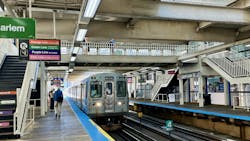CTA seeks solutions from businesses for new ‘challenge statements’
The Chicago Transit Authority (CTA) introduced two new challenge statements, points of issue the agency faces that it seeks businesses and organizations to pilot solutions for as part of its Innovation Studio. The new challenges statements zero in on improvement for non-English speaking riders and for creating enhanced simulative technology for rail operations training.
“Innovation Studio continues to expand its portfolio of innovative solutions, delivering diverse pilot projects ranging from improved wayfinding at bus stops to detecting and alerting intrusions on CTA’s track ‘right of way’,” said CTA Acting President Nora Leerhsen. “This latest round of challenge statements seeks to eliminate language barriers and help make the system navigable for our riders while another pilot will seek to find more ways to enhance ongoing rail operations training with a new, modern training tool.”
The first new challenge CTA seeks solutions for will address the following statement: “How can CTA provide rail station attendants with tools to welcome and assist riders with limited English proficiency?”
Over 13% of the people who live in CTA’s service area have limited English proficiency. CTA riders, who primarily speak a language other than English, can face unique challenges accessing and navigating transit services. This can include difficulty determining which train platform to board at a rail station, navigating from the station to their destination, interacting with fare machines and receiving timely notices when there are disruptions to service. Though CTA Customer Service Representatives/Assistants (CSR/As), who staff rail stations, are responsible for assisting riders with navigation and fare payment, they do not currently have tools at their disposal to support riders who speak a different language.
While the top languages spoken in the service area are Spanish, Polish, Chinese, Arabic, Cantonese, and Tagalog, CTA also serves customers visiting from a variety of domestic and international locations who may be unfamiliar with the transit system and need assistance with navigation.
The challenge statement seeks to pilot solutions that can enable CSR/As to engage riders through interpretation and/or translation devices, with the goal of allowing CTA staff to better communicate with riders speaking various languages. Proposals must be integrated into a stationary interactive display in stations to adhere with existing CTA policies. Translation and interpretation assistance are the main features requested, but innovators may propose other features that can enhance the customer experience.
The second new challenge CTA is seeking solutions for will address the following statement: “How can CTA provide simulated training opportunities for rail operators to gain additional hands-on experience?”
CTA is seeking a lightweight solution that simulates the rail operating environment to improve training available for rail operators who have completed their initial training period, to receive feedback and build skills for safe and efficient operation. Training opportunities, outside of real-life, on-the-job experience, are limited.
The agency says a rail simulator complementing CTA’s existing operator cab simulator would provide a cost effective, safe and efficient way for operators to continue to improve confidence and skills, leading to a more skilled workforce to navigate the complexities of CTA’s rail system.
CTA would prefer proposals from interested companies that can reasonably model rail cabs while maintaining portability and providing scenarios in a variety of weather and time of day conditions. However, simulators that utilize existing PCs or tablets will also be considered. The proposed solutions would be available to operators at a fixed location in at least one CTA training center and should have the ability for CTA to relocate them to other facilities as needed.
The agency notes there will be an opportunity for interested companies to learn more about the challenges and how to apply in an information session at a place and time in late September that’s to be determined. Interested vendors will be able to ask questions and get a better understanding of what is required.
Applications for both challenge statements are due by Oct. 21.
Last year, CTA launched three challenge statements during the inaugural year of the Innovation Studio program, and CTA has launched one other challenge so far this year. The agency is partnering with private sector entities to explore leading-edge ideas to improve rail system safety, to develop a new solution for bus stop asset management, to expand the availability of real-time information displays to bus riders and to mitigate the impact of secondhand smoke for riders on bus and rail vehicles.
There are currently four pilots in progress from the 2024 challenges. These include two pilots to install digital bus stops signs at up to 20 stops to provide real-time arrival information and system alerts, and two to automatically detect intrusion on the rail right-of-way. CTA will provide more updates as these, and other in-development pilots move forward.
